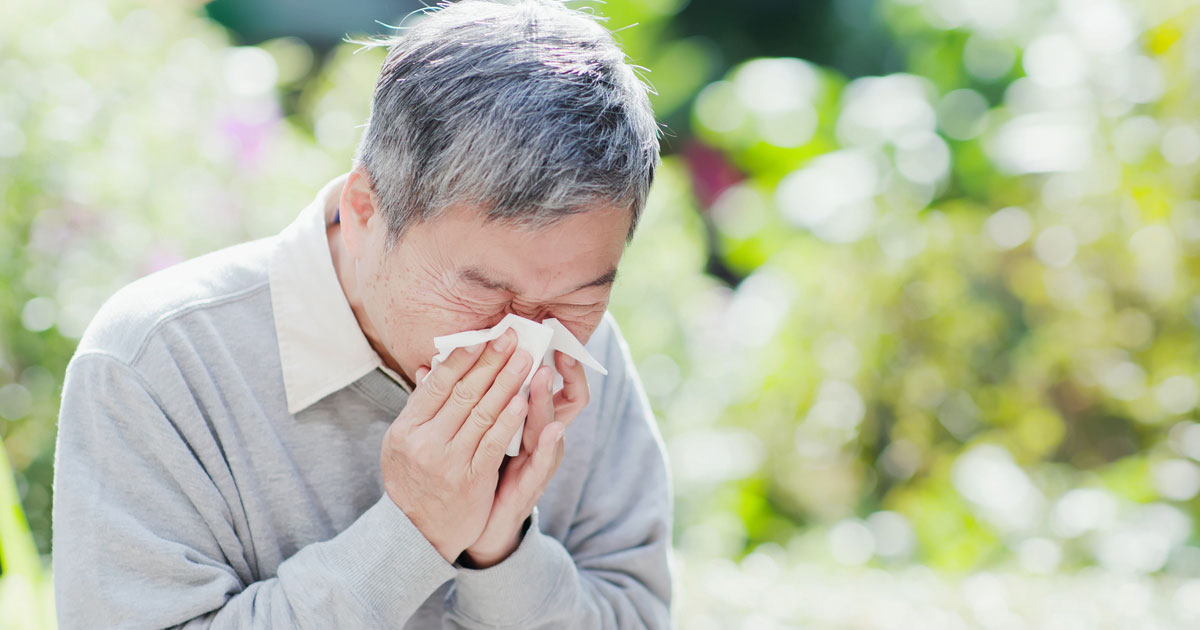
Allergy season can be a difficult time to navigate, particularly for seniors and their caregivers. Seasonal allergies are sometimes adult-onset, meaning someone can go their entire lives with no sensitivity only to develop allergies as an older adult. Allergy symptoms, while uncomfortable for any age, need to be treated differently in older adults. Here are some senior caregiver allergy tips to help detect, treat and get ahead of seasonal allergies and their uncomfortable symptoms.
For senior caregivers, it is important to pay attention to the circumstances under which allergy symptoms, such as sneezing, watery eyes and runny nose, develop. Pollen is not the only thing that can trigger seasonal allergies. Pine trees, grass and even mold (which thrives during warmer temperatures) can all be causes of uncomfortable seasonal allergy symptoms.
Certain conditions in older adults, such chronic as inflammation of the nasal cavity, can aggravate seasonal allergy symptoms and make them worse. It is important to monitor and make note of specific symptoms as they occur. Symptoms of other conditions, such as the flu, can be tough to distinguish from allergies. Click here for more information about distinguishing allergies from the flu.
Because allergies are not seen as life-threatening, many people do not bother to consult a physician when experiencing symptoms. Allergy symptoms can be more severe in older patients. Additionally, some elderly adults may not be able to express the level of discomfort they are in. Because of this, it is important for caregivers to consult a physician when allergy symptoms occur in elderly adults.
Discuss the symptoms with their physician, noting the triggers and reactions you have observed. Be sure to ask the physician whether allergies could potentially aggravate other existing medical conditions. Make a plan with the physician for the future management of allergy symptoms. This plan will include which over-the-counter medications, if any, would be appropriate to use.
As you discuss treatment options with the physician, keep in mind that many over-the-counter allergy treatments, particularly antihistamines, are not recommended for older adults. According to the American Academy of Allergy Asthma & Immunology (AAAAI), there are two main types of antihistamines: first generation antihistamines and second generation antihistamines. First generation antihistamines, such as Benadryl, can cause symptoms in older adults such as confusion, blurred vision, anxiety and urinary issues. Second generation antihistamines, such as Claritin, cause fewer side effects in older adults.
Because of these possible side effects, always consult with a physician before using any type of allergy medication. Just because a medication is available over-the-counter does not mean that it is automatically safe to use, particularly in older adults.
Although you can’t stop allergy season from happening, as a caregiver, you can limit an older adult’s exposure to allergens as much as possible. Although it’s not ideal to limit time spent outdoors in the fresh air, it might be best for some elderly adults to do so during certain times of year.
It also helps to limit the allergens that are brought inside an elderly adult’s living space. Dust and clean surfaces often to remove traces of pollen or grass that may have been tracked inside. Even clothes that have been worn outdoors can track pollen inside and cause a reaction. Wash jackets and outerwear often. Keep windows and doors closed, and incorporate fans and air purifiers into the living space.
Allergy season can be an uncomfortable time, particularly for elderly adults. As a caregiver, it’s important to be proactive. Consult with medical professionals and prevent allergy symptoms as much as possible before they occur. At Advent Christian Village, our community medical services are designed to ensure each member’s individual well-being, optimal health and independence. Learn more about medical and care service for seniors at Advent Christian Village by calling 1-800-647-3353 today.